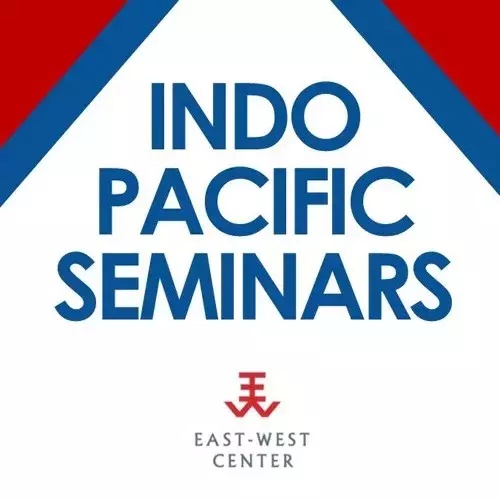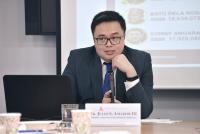Error message

OFFICE/DEPARTMENT
US-Philippines Alliance 2.0: Continuities, Challenges, and Complexities
An Indo-Pacific Foreign Policy and Defense Seminar featuring:
Mr. Julio S. Amador III
Executive Director, Philippine-American Educational Foundation
Fellow, Asia-Pacific Pathways to Progress
Dr. Satu P. Limaye (Moderator)
Vice President & Director, East West Center in Washington
The alliance between the United States and the Philippines, officially anchored in the Mutual Defense Treaty of 1951, has seen recent challenges to the normally close bond. While the alliance was predicated on mutual response to conventional

conflicts, it has seen itself go beyond this with the US strongly assisting the Philippines on counter terrorism. However, gray zones tactics in the South China Sea and the repercussions of Scarborough have challenged the ways in which the alliance could be implemented.
In this seminar, Mr. Julio S. Amador III discussed recent developments in the alliance and provide a Filipino perspective on the complexity surrounding the US-Philippines alliance and debates on these matters in the Philippines.
For more images, please visit the album for this event on the East-West Center's Flickr page.
Mr. Julio S. Amador III is the Executive Director of the Philippine-American Educational Foundation (The Fulbright Commission in the Philippines). He was Director of the Performance and Projects Management Office-Security, Justice, and Peace Cluster at the Office of the Cabinet Secretary, Office of the President of the Philippines from December 2017-November 2018. He also served as Deputy Director-General of the Foreign Service Institute from 2014-2017. He was a Fulbright Graduate Scholar at the Maxwell School of Citizenship and Public Affairs, Syracuse University and an Asia Studies Visiting Fellow at the East-West Center in Washington DC. Mr. Amador has published peer-reviewed journal articles, book chapters, and op-eds/commentaries in on-line news media. He co-edited the book “A Handbook on Philippine Public Diplomacy.” He is an active participant in Track 1.5 and Track 2 diplomatic processes on regional security issues. He is a Fellow of the Asia-Pacific Pathways to Progress and serves as a member of the Board of Advisers to the New Era University-ASEAN Studies Center. He teaches International Relations, International Security, International Organizations, and International Law in various professional schools and universities.
Satu Limaye is Vice President and Director of the East-West Center in Washington where he created and now directs the Asia Matters for America initiative and edits the Asia Pacific Bulletin. He is also a Senior Advisor at CNA Corp (Center for Naval Analyses) and Senior Fellow on Asia History and Policy at the Foreign Policy Institute at Paul H. Nitze School of International Studies (SAIS). He is a magna cum laude and Phi Beta Kappa graduate of Georgetown University and received his doctorate from Oxford University (Magdalen College) where he was a George C. Marshall Scholar. Dr. Limaye publishes and presents on a range of Indo-Pacific issues. Recent publications include: Raging Waters: China, India, Bangladesh and Brahmaputra River Politics (with Nilanthi Samaranayake and Joel Wuthnow); Why ASEAN is Here to Stay and What that Means for the US; The United States-Japan Alliance and Southeast Asia: Meeting Regional Demands; and Weighted West: The Indian Navy’s New Maritime Strategy, Capabilities, and Diplomacy.
US-Philippines Alliance 2.0: Continuities, Challenges, and Complexities
An Indo-Pacific Foreign Policy and Defense Seminar featuring:
Mr. Julio S. Amador III
Executive Director, Philippine-American Educational Foundation
Fellow, Asia-Pacific Pathways to Progress
Dr. Satu P. Limaye (Moderator)
Vice President & Director, East West Center in Washington
The alliance between the United States and the Philippines, officially anchored in the Mutual Defense Treaty of 1951, has seen recent challenges to the normally close bond. While the alliance was predicated on mutual response to conventional

conflicts, it has seen itself go beyond this with the US strongly assisting the Philippines on counter terrorism. However, gray zones tactics in the South China Sea and the repercussions of Scarborough have challenged the ways in which the alliance could be implemented.
In this seminar, Mr. Julio S. Amador III discussed recent developments in the alliance and provide a Filipino perspective on the complexity surrounding the US-Philippines alliance and debates on these matters in the Philippines.
For more images, please visit the album for this event on the East-West Center's Flickr page.
Mr. Julio S. Amador III is the Executive Director of the Philippine-American Educational Foundation (The Fulbright Commission in the Philippines). He was Director of the Performance and Projects Management Office-Security, Justice, and Peace Cluster at the Office of the Cabinet Secretary, Office of the President of the Philippines from December 2017-November 2018. He also served as Deputy Director-General of the Foreign Service Institute from 2014-2017. He was a Fulbright Graduate Scholar at the Maxwell School of Citizenship and Public Affairs, Syracuse University and an Asia Studies Visiting Fellow at the East-West Center in Washington DC. Mr. Amador has published peer-reviewed journal articles, book chapters, and op-eds/commentaries in on-line news media. He co-edited the book “A Handbook on Philippine Public Diplomacy.” He is an active participant in Track 1.5 and Track 2 diplomatic processes on regional security issues. He is a Fellow of the Asia-Pacific Pathways to Progress and serves as a member of the Board of Advisers to the New Era University-ASEAN Studies Center. He teaches International Relations, International Security, International Organizations, and International Law in various professional schools and universities.
Satu Limaye is Vice President and Director of the East-West Center in Washington where he created and now directs the Asia Matters for America initiative and edits the Asia Pacific Bulletin. He is also a Senior Advisor at CNA Corp (Center for Naval Analyses) and Senior Fellow on Asia History and Policy at the Foreign Policy Institute at Paul H. Nitze School of International Studies (SAIS). He is a magna cum laude and Phi Beta Kappa graduate of Georgetown University and received his doctorate from Oxford University (Magdalen College) where he was a George C. Marshall Scholar. Dr. Limaye publishes and presents on a range of Indo-Pacific issues. Recent publications include: Raging Waters: China, India, Bangladesh and Brahmaputra River Politics (with Nilanthi Samaranayake and Joel Wuthnow); Why ASEAN is Here to Stay and What that Means for the US; The United States-Japan Alliance and Southeast Asia: Meeting Regional Demands; and Weighted West: The Indian Navy’s New Maritime Strategy, Capabilities, and Diplomacy.









